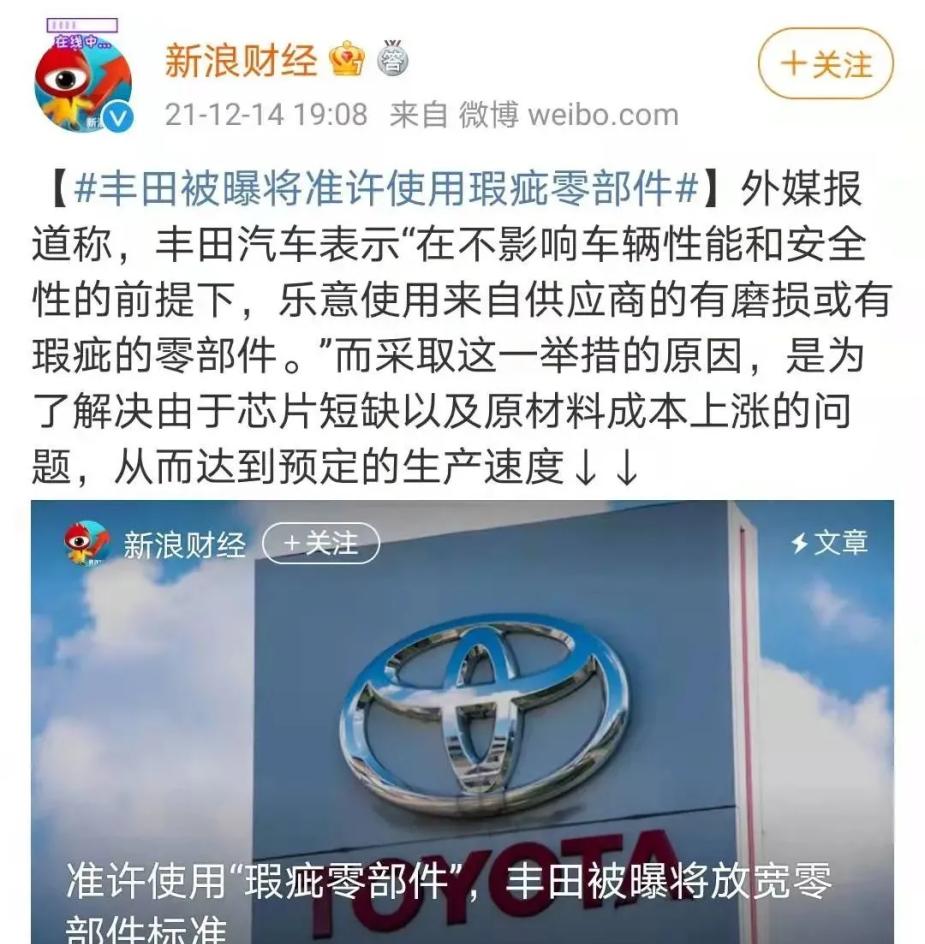A few days ago, Toyota Motor motor declared: "In order to alleviate the pressure on the supply chain, we are willing to use wear and tear or defective parts from suppliers without affecting the performance and safety of the vehicle."
Toyota pointed out that "defective parts" refer to parts that do not have problems with use or product defects, but have slight wear or scratches. In the past, such "defective parts" were directly scrapped.

On the 10th, Toyota also released a vehicle recall information, and the number of recalled vehicles was quite staggering, close to 900,000 vehicles.
After the two things came out, many netizens asked incomprehensibly: Is this still the Toyota that can't be broken?
The Car 300 used car learned from the website of the State Administration for Market Regulation that in this recall, the Camry has become a "key care" model, and 344898 vehicles will be recalled.
The number of RAV4 and C-HR recalls has also exceeded 100,000 units, and the five Models of the Lexus brand will also recall a total of 127,000 units.
The reason for the recall is that the internal components of the vehicle's engine exhaust gas recirculation valve may be corroded by the higher concentration of chlorine in the fuel, resulting in poor valve body movement.
It may cause the engine to run poorly, and in extreme cases, the vehicle will be turned off at low speed, increasing the risk of collision accidents and potential safety hazards.
In fact, this is not the first time that Toyota has recalled vehicles on a large scale this year.
As early as June and July this year, Toyota has launched two recalls, both of which exceeded 200,000 vehicles due to the misassembly assembly of internal components of the high-pressure fuel pump, the imperfect brake control computer program of the vehicle's adaptive cruise system, and the safety hazards.
The two recalls involved the Corolla, Highlander, Raling, and Lexus RX, which have been selling and reputable models.
Frequent product quality issues and large-scale vehicle recalls seem to be the opposite of most Chinese consumers' perception of Toyota's "durability."
In fact, not only Toyota, but also the Japanese brands that we think are "good quality", "durable", and "fuel-efficient" have had large-scale recalls in recent years.
Among the reasons for these recalls, not only the brand itself, but also the Japanese parts and components company.
According to the surging news, in 2020, Mitsubishi, Toyota, Lexus, Honda, Acura, and Mazda have all recalled vehicles due to fuel pump manufacturing problems, because some of their models use low-pressure fuel pumps provided by Denso.
These six Japanese brands have recalled a total of 2741469 passenger cars because of this problem alone.
Once, the quality of stable and reliable is the "golden signboard" of Japanese cars, Japanese brands and Japanese companies have also been praised by many media as having "ingenuity spirit", good reputation has made Japanese brands in the Chinese market for many years, many models have been at the forefront of the sales list.
However, in recent years, Japanese brands seem to have "laxed" in quality control, resulting in frequent product quality problems, and events such as "Takata air bags", "machine throttles", and "stall doors" have been widely affected.
A large number of recalls not only cost a huge amount of money, but also lost the good reputation that the brand has won for so many years.